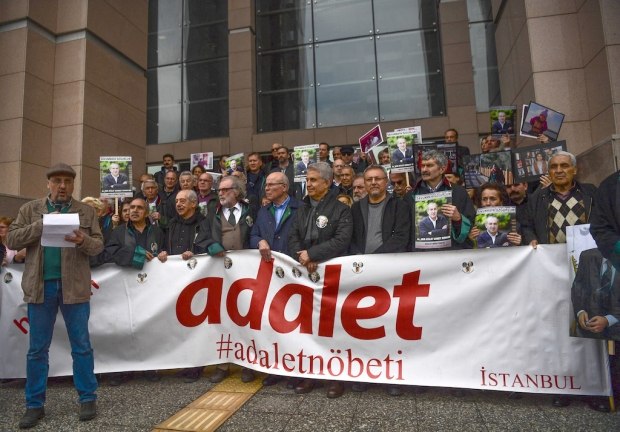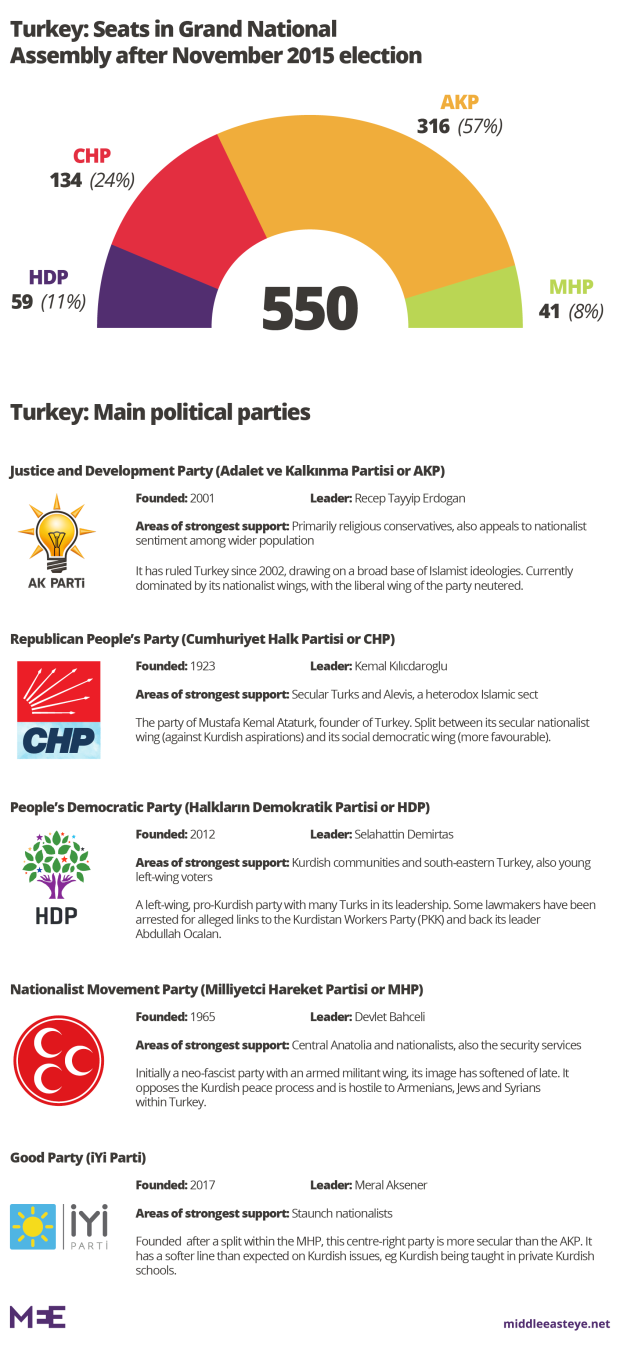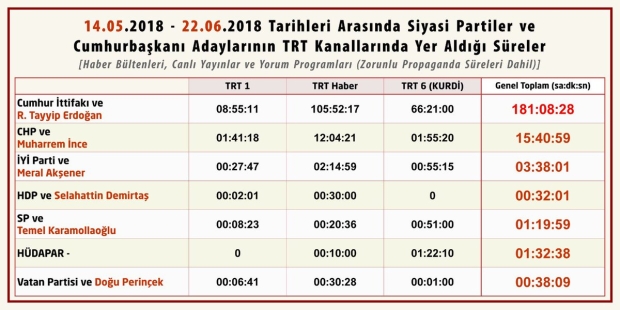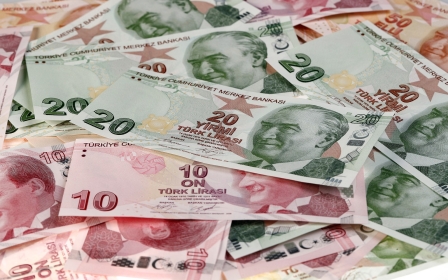Turkish elections: Once-jailed journalist eyes HDP parliamentary seat
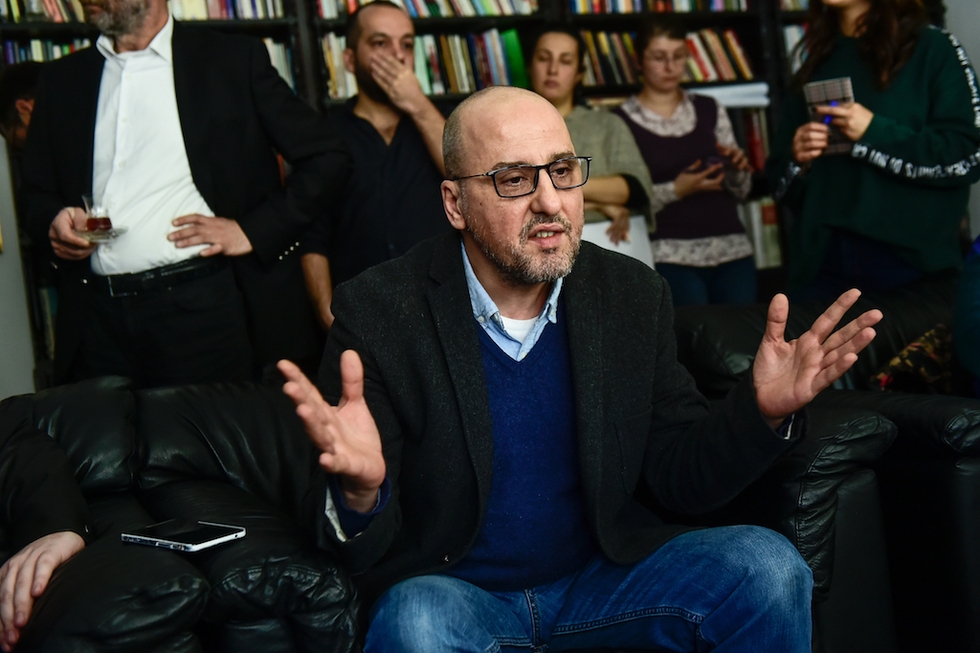
BURSA, Turkey - On Thursday, in the large industrial city of Bursa, hundreds waited with excitement to get their book signed by Turkish journalist Ahmet Sik.
This was not a regular book signing event, but rather an election rally for the pro-Kurdish Peoples' Democracy Party (HDP). With elections due to take place across the country on Sunday, the outspoken journalist is running as an Istanbul candidate for the left-wing HDP.
In a recent interview, Sik described journalism as akin to being "the eyes of the blind, the ears of the deaf, and the voice of the mute," and said that this was his motivation behind becoming a parliamentary candidate.
"In Turkey, the Kurdish issue is like a thin black sheet that covers all other matters," Sik told Middle East Eye while campaigning in Bursa.
"In many ways, supporting HDP is like putting your hand underneath a stone – but it is a risk everybody needs to take because the struggle for Kurdish rights and the struggle for democracy are intertwined."
Sik is most famous for his book The Imam's Army, published in 2011, which laid bare the infiltration of the Hizmet movement of US-based cleric Fethullah Gulen into Turkey's police force and other civil institutions.
At the time, the book was banned by the Turkish government, which claimed its publication was linked to the Ergenekon group, an alleged conspiracy of secular ultra-nationalists who aimed to launch a coup in Turkey.
Supporters of Gulen in the judiciary were thought to be the main instigators of prosecutions against supposed Ergenekon supporters, which resulted in the neutralisation of the military's influence on politics.
The situation is very different to last year. With all the rumours circulating around, it is clear that the AKP has entered a crisis of legitimacy and crisis of governance
- Ahmet Sik
This made it all the more peculiar when Sik was arrested in 2016 supposedly for actually being a supporter of Gulen.
Since the failed coup in July 2016, which the government has blamed on Gulen, the HDP has also been the subject of a government crackdown.
Nine of the party's 59 MPs elected in 2015 are currently behind bars, including the presidential candidate Selahattin Demirtas, along with thousands of party officials, most of whom are being held in pre-trial detention accused of links to the Kurdistan Workers' Party (PKK), which Turkey considers a terrorist organisation.
But on the campaign trail the mood within the HDP camp has been upbeat, with many believing the party can exceed the 13 percent share of the national vote it achieved in the first of two parliamentary elections in 2015.
"Despite all the arrests, which were designed to limit our ability to campaign for this election, the party mood feels similar to that of the June 2015 campaign," a party activist told Middle East Eye.
Sik, an ethnic Turk, is one such candidate.
Sik gained international attention last year when court transcripts of his impassioned defence of his journalism during his trial were made public. When the prosecutor asked about one tweet in which he claimed the state was a killer, Sik replied: "I haven't said enough. The state is a serial killer."
Sik's new book, I accuse, is an account of his trial in which he develops his courtroom defence into a broader attack on the Turkish state. He was released from prison in March, and his continuing defiance has earned the admiration of others critical of the government.
"During a period where many are fearful of the state, Ahmet Sik's refusal to bow down and [that he] continue[s] to speak his mind is why he is admired by all," a Bursa local who asked not to be named told MEE while waiting eagerly to get Sik's latest book signed.
While addressing a packed room full of retired teachers in Bursa who were sceptical of a party focusing on furthering Kurdish rights, the journalist-turned-politician stressed that while greater Kurdish rights remains a cornerstone of HDP's policies, his party was not "just a vote for Kurds, but a vote for the plurality of this country. We want an understanding of tolerance and diversity to become a central characteristic of this country."
The HDP's ability to obtain the mandatory 10 percent of the national vote needed to take up seats in parliament could be crucial in the election, with many seeing the party's ability to pass the threshold as key to preventing the ruling Justice and Development Party (AKP) from regaining a majority in parliament.
"If we pass the 10 percent barrier, AKP will most certainly lose their majority in parliament," Sik told MEE.
"However, if we fail to pass the threshold, there will be 60-80 MPs taken away from us and given to the AKP. This means Erdogan will become the master of all power in Turkey. The HDP stands in the way of Erdogan achieving his dream."
Such a message was reiterated by Demirtas during a short telephone interview with his wife that was released by the HDP on 6 June.
"While I am here within four walls, I know that thousands of Demirtases are out in the fields, on farms, picking hazelnuts. He is fired, he is unemployed, the poor. He is the youth, the woman and the child. He is Turkish, Kurdish, Circassian, Pomak, Bosnian. He is Alevi, Sunni, but above all he is hopeful and full of vigour."
'A crisis of legitimacy'
HDP concerns about the party's ability to achieve the 10 percent threshold have been heightened by a reported leaked video of Erdogan addressing AKP party activists in Istanbul in which he appeared to say it would be in the AKP's interests if the HDP fell short of the threshold, and suggesting that they put "tight marking" on voters.
In response, the HDP accused Erdogan of plotting to "steal our votes by cheating and pressure".
International observers raised concerns about possible vote-rigging during last year's constitutional referendum. Turkey's foreign ministry said election monitors lacked objectivity and impartiality.
"The situation is very different to last year. With all the rumours circulating around, it is clear that the AKP has entered a crisis of legitimacy and crisis of governance," Sik said.
Although Muharrem Ince, the presidential candidate for the Republican People's Party (CHP) and the most likely challenger to Erdogan's presidential ambitions, has attempted to reach out to the Kurds by holding successful rallies in the south-east and publically calling for Demirtas' release, many voters still remain suspicious of a party whose roots can be firmly traced back to the Kurdish movement.
Back at a campaign meeting in Bursa, Sik was asked by a retired teacher why the HDP continued to act like a regional party, rather than a national one.
Sik said that a media blackout against the HDP meant that people's impressions of the party were heavily influenced by the government's narrative.
"The question you should ask is why are we not able to ask these questions to the HDP publically and transparently? This is the crucial question – why is the state so afraid to let HDP explain themselves?"
According to statistics release by the Radio and Television Supreme Council (RTUK), the HDP received the least coverage of all the major parties on the state-run TRT channel - less than Dogu Perincek of the Patriotic Party, who is at around 0.4 percent in the presidential polls:
In many ways, candidates like Sik are key to the HDP's hopes in courting votes from across Turkey, especially CHP votes. Sik has previously described himself as between CHP and HDP, but he said he believed the pro-Kurdish party offered the fiercest resistance to the ruling government.
"The HDP is a party that is undoubtedly born out of the Kurdish issue, and from that perspective I can see why people perceive us as a regional party. But, through their policies, political language and candidates, the HDP have placed a lot of emphasis on a whole range of issues that proves we cannot see them as a purely regional party," Sik told MEE.
"The intention and effort of HDP is clear, but for this unity to become deeper, we also need peace in this country."
Middle East Eye propose une couverture et une analyse indépendantes et incomparables du Moyen-Orient, de l’Afrique du Nord et d’autres régions du monde. Pour en savoir plus sur la reprise de ce contenu et les frais qui s’appliquent, veuillez remplir ce formulaire [en anglais]. Pour en savoir plus sur MEE, cliquez ici [en anglais].


